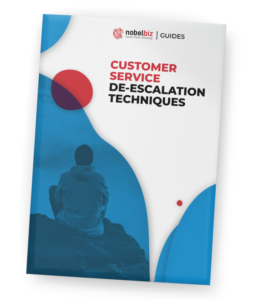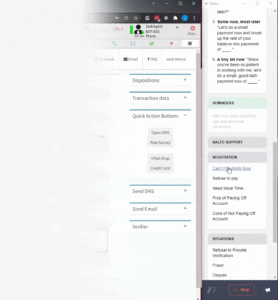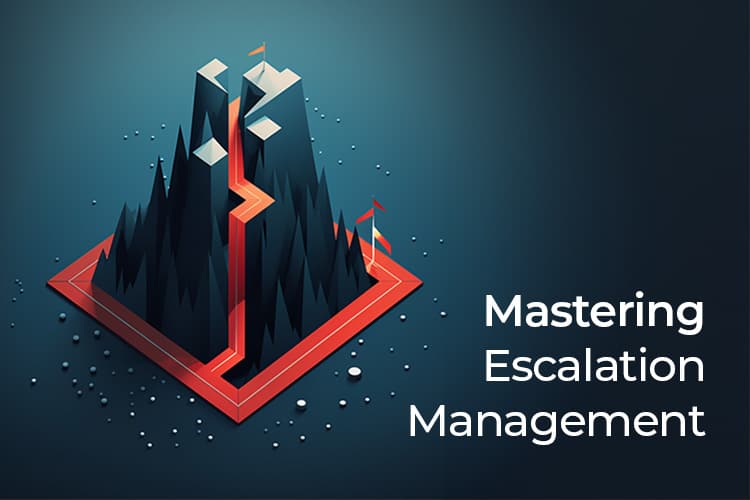Have you ever wondered how call centers manage the overwhelming number of customer calls, especially those tricky situations that require immediate attention? The secret lies in effective escalation management, a crucial aspect often overlooked.
In this article, we’ll explore how technology can be a game-changer in managing call escalations, ensuring swift and satisfactory resolutions.
Understanding Escalation Management
Escalation management is a crucial process in call centers that involves handling customer inquiries or complaints that cannot be resolved at the initial point of contact. It is like a relay race, where the baton of customer queries is passed on to the right expert swiftly and efficiently.
 When customers reach out to a call center, they often expect their issues to be resolved immediately. However, some situations may require additional expertise or attention. This is where escalation management comes into play. It ensures that customer inquiries or complaints that cannot be resolved by the initial representative are escalated to the appropriate individuals or teams who have the necessary knowledge and skills to address them effectively.
When customers reach out to a call center, they often expect their issues to be resolved immediately. However, some situations may require additional expertise or attention. This is where escalation management comes into play. It ensures that customer inquiries or complaints that cannot be resolved by the initial representative are escalated to the appropriate individuals or teams who have the necessary knowledge and skills to address them effectively.
If you want to learn more about Customer Service De-Escalation, delve into our comprehensive guide! Discover tried-and-tested techniques to navigate challenging conversations in the customer service and contact center arena. From maintaining composure to offering your perspective, this resource equips you with the skills to turn tense interactions into positive outcomes.
The Role of Technology in Escalation
In a call center, escalation management is a crucial process that ensures customer complaints or issues are resolved by a specialist, more experienced, or senior company representative. According to Forbes, call center metrics are the data harvested from all the solutions used to operate a call center, such as call center management (CCM) and customer relationship management (CRM) platforms. Metrics and KPIs in a call center can range from tracking the time agents spend on a task to the number of calls they take per hour. These data can be organized and analyzed to help better understand what’s happening in the call center .
The industry benchmark for supervisor escalation is 10% or less . Therefore, reducing escalations is key to contact center efficiency and when ignored, it can have a drastic impact on the bottom line .
One of the key benefits of technology in escalation management is the ability to provide faster response times. With the integration of customer relationship management (CRM) systems, intelligent routing algorithms, and automated ticketing systems, call centers can ensure that customer queries are promptly directed to the appropriate department or agent. This eliminates the need for customers to be transferred multiple times, reducing their wait times and increasing their overall satisfaction.

Brayan Carpio
“The technology aspect of NobelBiz stood out compared to the competition, and also the great team! All the way from onboarding to support to troubleshooting has been great throughout this journey!”
Key Technological Tools and Solutions
What are these magical tools? We’re talking about integrated customer relationship management (CRM) systems, intelligent routing algorithms, and automated ticketing systems, to name a few. These tools ensure that no customer query falls through the cracks.
By integrating CRM systems, intelligent routing algorithms, and automated ticketing systems, call centers ensure prompt and efficient handling of customer queries. AI-powered smart assistants provide background information and tailored solutions, improving customer satisfaction. Real-time monitoring and analytics identify and address bottlenecks, streamlining the escalation process. Automation of routine tasks allows agents to focus on complex issues, resulting in faster resolutions. Training staff on tech tools enhances efficiency and customer service. Ultimately, technology enhances the customer experience by reducing wait times, providing accurate solutions, and prioritizing high-risk escalations.
Nobelbiz’s Voice Carrier Network offers advanced routing capabilities, ensuring that customer calls are quickly directed to the most qualified agents, reducing resolution time significantly.
Integrating AI for Smarter Responses
 Imagine having a smart assistant that not only directs calls to the right department but also provides the support staff with a background of the customer’s issue. That’s AI for you – enhancing the understanding of customer needs for tailored solutions.
Imagine having a smart assistant that not only directs calls to the right department but also provides the support staff with a background of the customer’s issue. That’s AI for you – enhancing the understanding of customer needs for tailored solutions.
According to a recent survey by McKinsey, one-third of the respondents say their organizations are using generative AI regularly in at least one business function. The survey also confirms the explosive growth of generative AI (gen AI) tools, with 40% of respondents saying their organizations will increase their investment in AI overall because of advances in gen AI .
AI-powered smart assistants can indeed enhance the understanding of customer needs for tailored solutions. These smart assistants utilize natural language processing and machine learning algorithms to analyze customer inquiries and provide accurate solutions.
Real-time Monitoring and Analytics
Real-time analytics is a powerful tool in the world of call center escalation management. As the saying goes, “knowledge is power,” and real-time analytics provide exactly that. By monitoring calls as they happen, managers can gain valuable insights into the performance of their teams and identify any bottlenecks or issues that may be hindering the resolution of customer inquiries.
With real-time analytics, managers can track key metrics such as average handle time, first call resolution rate, and customer satisfaction scores. By analyzing this data in real-time, they can quickly identify patterns or trends that may indicate areas for improvement.
According to a survey by Forbes, analyzing the performance of a call center can allow you to measure the efficacy of the call center and identify areas that need to be improved. Call center metrics are the data you harvest from all the solutions you use to operate your call center, such as your call center management (CCM) and customer relationship management (CRM) platforms. Metrics and KPI’s in a call center can range from tracking the time agents spend on a task to the number of calls they take per hour. This data can be organized and analyzed to help you better understand what’s happening in your call center. Here are 11 essential call center metrics and KPIs that can help you to better measure and improve the performance of your call center .
Implementing Nobelbiz’s solutions can lead to an increase in efficiency, as real-time data aids in faster decision-making and issue resolution.
For example, if they notice a sudden increase in call duration or a decline in customer satisfaction, they can immediately investigate the underlying causes and take corrective actions.
Furthermore, real-time analytics allow managers to proactively address any issues that may arise during the escalation process. They can monitor the progress of individual cases and intervene if necessary to ensure that customer inquiries are being handled efficiently and effectively.
Also, if they notice a case that has been open for an unusually long time, they can assign additional resources or escalate it to a higher level of expertise to expedite the resolution.
Automating Workflow for Faster Resolution
Automation is like having an extra set of hands, taking care of routine tasks, and freeing up human agents to handle more complex issues. Automated workflows streamline the escalation process, making it faster and more efficient.
For example, when a customer query comes in, an automated ticketing system can automatically assign it to the appropriate department or agent based on predefined criteria such as the nature of the issue or the expertise required. This eliminates the need for manual triaging and ensures that the query reaches the right person without any delays.
Once the query is assigned, automated workflows can further streamline the resolution process. Routine tasks such as gathering customer information, checking order statuses, or updating customer records can be automated, freeing up agents to focus on more complex issues that require their expertise. This not only speeds up the resolution time but also reduces the chances of errors or oversights that can occur with manual data entry.
For example, if a query needs to be escalated to a higher level of expertise, an automated workflow can notify the relevant team or individual, ensuring that the escalation happens seamlessly and without any delays.
Enhancing Customer Experience
At the end of the day, it’s all about making customers happy. By reducing wait times, providing accurate solutions, and prioritizing high-risk escalations, technology directly contributes to a better customer experience. In addition to reducing wait times, technology in escalation management allows call centers to prioritize high-risk escalations. By monitoring calls in real-time and analyzing key metrics, managers can identify urgent cases that require immediate attention. This proactive approach ensures that critical issues are escalated to the appropriate level of expertise promptly, resulting in faster resolutions and higher customer satisfaction.

Brad Dashnaw
”Their software is easy to use, easy to implement, and able to be integrated with our own platforms. We were able to train people easily, and deploy it to their computers in their home offices to keep productivity going!”
Navigating the Technological Landscape of Escalation Management
Perfecting escalation management processes within contact centers is a formidable task, laden with technological challenges that demand adept solutions for a seamless transition. Embracing new technology can be a game-changer, yet hurdles abound. Staff resistance poses an initial obstacle, necessitating effective communication by call center managers about the technology’s benefits in enhancing workflow, streamlining processes, and elevating customer satisfaction.
Navigating Integration Challenges:
Integrating new technology with existing systems poses a significant hurdle. Collaborating with IT professionals and vendors to assess compatibility is crucial. Rigorous testing in a controlled environment before full implementation helps identify and address integration issues early, ensuring a seamless technological ecosystem.
Strategic Budgeting for Success:
Budget constraints add complexity to implementation. To optimize resources, call center managers explore alternatives like cloud-based platforms or software-as-a-service models, offering cost-effective solutions. This allows for strategic allocation of resources, prioritizing technology investments based on their impact on customer satisfaction and overarching business goals in the realm of escalation management. Overcoming these challenges ensures a more efficient, responsive, and customer-centric contact center environment.
Nobelbiz offers comprehensive training and customer support, ensuring a seamless transition and integration with existing systems, overcoming common hurdles faced in the implementation of new technologies.
Experience unparalleled support with dedicated Client Advocates and Optimization Managers. Benefit from world-class voice services and cloud solutions, all backed by innovative 24/7/365 support. Join our satisfied clients—schedule a demo now for a refreshing approach to success!
Measuring the Impact of Tech Solutions
Determining the effectiveness of technological solutions in escalation management is crucial to understand whether your investment is paying off. By tracking relevant metrics and Key Performance Indicators (KPIs), call centers can gain valuable insights into the impact of their tech solutions and make informed decisions for further improvements.
One important metric to consider is the average resolution time. By analyzing the time it takes to resolve customer inquiries before and after implementing new technology, call centers can assess whether the tech solutions have helped streamline processes and expedite issue resolution. A decrease in average resolution time indicates that the technology is effectively reducing wait times and improving efficiency.
 Customer satisfaction is another key metric to measure the impact of tech solutions. By surveying customers after their interactions with the call center, managers can gauge their overall satisfaction level and identify any changes resulting from the implementation of new technology. Positive feedback, increased Net Promoter Scores (NPS), and a reduction in customer complaints are indicators that the tech solutions are contributing to a better customer experience.
Customer satisfaction is another key metric to measure the impact of tech solutions. By surveying customers after their interactions with the call center, managers can gauge their overall satisfaction level and identify any changes resulting from the implementation of new technology. Positive feedback, increased Net Promoter Scores (NPS), and a reduction in customer complaints are indicators that the tech solutions are contributing to a better customer experience.
Read this article on How to Measure and Analyze The Customer Satisfaction Score CSAT?
 Tracking first contact resolution (FCR) rate is essential in measuring the effectiveness of tech solutions. FCR refers to the percentage of customer inquiries that are resolved during the first interaction with the call center, without the need for further escalations or follow-ups. A higher FCR rate indicates that the technology is enabling agents to provide accurate solutions promptly, leading to higher customer satisfaction and lower operational costs.
Tracking first contact resolution (FCR) rate is essential in measuring the effectiveness of tech solutions. FCR refers to the percentage of customer inquiries that are resolved during the first interaction with the call center, without the need for further escalations or follow-ups. A higher FCR rate indicates that the technology is enabling agents to provide accurate solutions promptly, leading to higher customer satisfaction and lower operational costs.
 Another metric to consider is agent productivity or performance. By analyzing the number of inquiries handled per agent before and after implementing new technology, call centers can determine whether the tech solutions have increased agent efficiency. An increase in productivity, without compromising the quality of customer service, suggests that the technology is effectively supporting agents in their daily tasks.
Another metric to consider is agent productivity or performance. By analyzing the number of inquiries handled per agent before and after implementing new technology, call centers can determine whether the tech solutions have increased agent efficiency. An increase in productivity, without compromising the quality of customer service, suggests that the technology is effectively supporting agents in their daily tasks.
Lastly, cost savings are an important factor to consider when measuring the impact of tech solutions. By comparing the costs associated with implementing and maintaining the technology against the benefits gained, call centers can determine whether the investment is financially viable. Reduced operational costs, such as lower agent training expenses or decreased employee turnover, can indicate that the tech solutions are delivering a positive R.O.I.
In conclusion, embracing technology in escalation management is essential for modern call centers aiming for excellent customer service. Implementing advanced tools and systems can streamline processes, reduce wait times, and improve efficiency. AI and machine learning revolutionize customer inquiries, providing real-time solutions and handling larger query volumes.
Omnichannel communication ensures seamless interactions and personalized experiences. Big data and analytics offer valuable insights for proactive intervention and data-driven decision-making. Automation with RPA frees up agents for complex issues, enhancing the customer experience. Measuring key metrics like resolution time, satisfaction, FCR, productivity, retention, and cost savings helps assess the impact of tech solutions. Embracing technology in escalation management is a game-changer for call centers, delivering exceptional service and driving business growth in the digital age.
If you want to set up your escalation management, get in touch with one of our experts here.

Michael McGuire is a contact center industry expert with almost two decades of experience in the space. His experience includes roles as Director of Contact Center Digital Transformation at NobelBiz, and as Director of Operations at FLS Connect, managing multiple call centers. As President of Anomaly Squared and Targeted Metrics, Michael successfully transitioned companies into remote operations and significantly boosted revenues. With a strong background in customer service, leadership, strategic planning, and operations management, Michael excels in driving growth and innovation in the call center space.
Mike is also a proud Board Member for R.E.A.C.H Trade Group, promoting consumer protection and satisfaction and Co-host of the Off Skripted Podcast – a show about Life, Call Centers and everything in between.







